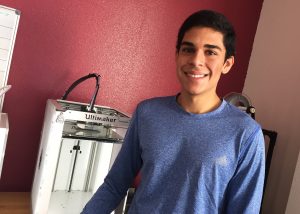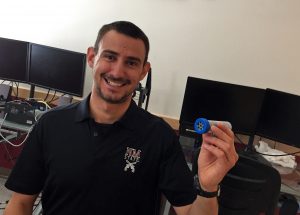By: Tiffany Acosta
 |
|
| Jordan Glaze, a New Mexico State University mechanical and aerospace engineering junior and Innovator in the Aggie Innovation Space, helped Josiah Brooks create a prototype of a feed intake device for cattle. (NMSU photo by Tiffany Acosta) MAR17 |
New Mexico State University Department of Animal and Range sciences junior Josiah Brooks is creating a feed intake device for cattle, and he is working with the Aggie Innovation Space to design and develop parts for a prototype.
Through an NMSU College of Agricultural, Consumer and Environmental Sciences USDA-Hispanic Serving Institution LEADERS grant awarded to the Animal Science Department, Brooks is conducting a research trial to develop a marker system to determine feed intake in grazing cattle that will allow researchers to investigate how grazing management and supplementation programs can improve cattle health and performance.
To properly manage rangelands, ranchers need to understand grazing cattle nutrition and have the ability to quantify how much cattle eat when they are grazing in a pasture, according to Eric Scholljegerdes, Animal and Range Sciences associate professor and Brooks’ faculty adviser.
Researchers obtain this data with an inert marker (not digested), titanium dioxide, which is typically administered to cattle twice daily. Unfortunately, this dosing method requires manpower and interrupts grazing. Brooks is working on a device that will be inserted into the stomach of cattle and will automatically release the marker over a period of time.
 |
|
| Josiah Brooks, an animal sciences junior at New Mexico State University, holds a prototype for a cattle feed intake device. Brooks is working with Jordan Glaze, an Innovator with the Aggie Innovation Space, to create two parts for the prototype. (NMSU photo by Tiffany Acosta) APR17 |
To create a cap and a plunger for a prototype, Brooks has been working with Jordan Glaze, an Aggie Innovator in the Aggie Innovation Space Presented by Intel in the College of Engineering.
“The Aggie Innovation Space has allowed us to develop parts for this device that would otherwise be unavailable,” Scholljegerdes said. “We are very grateful for the wonderful help we have received thus far from the personnel at the Aggie Innovation Space. Without their help we would not be where we are at in the development process.”
As a former engineering student, Brooks knew about the Aggie Innovation Space and started working with Glaze in late 2016.
“I’m extremely happy with the Aggie Innovation Space,” Brooks said. “Jordan, specifically, because working with that level of technology is extremely challenging. I didn’t realize how much effort went into designing something on a software program.”
“You can’t do that without patience and you can’t do that unless you have a passion,” he added. “You feel welcome as a student even though you are not in the department, a completely different department, but they help and that’s what they want to do and that’s their passion. It’s been a very positive experience for me. I wouldn’t have gone back if I didn’t get that experience.”
A junior majoring in both mechanical and aerospace engineering, Glaze said he has enjoyed working with Brooks on his first animal science project. A few of projects Glaze has recently assisted on are from the industrial engineering department, art department, geology department and a community outreach project for a dog wheelchair for a NMSU employee.
“The Aggie Innovation Space is based around developing cross disciplinary skills focused on engineering specifically, but also branching out into different disciplines such as this case being animal science,” Glaze said.
“We guide projects from the very first stage, and work with our clients to help them get to the prototyping and later the manufacturing stages,” Glaze noted. “We work very hard to make projects successful, but focus on not doing the project for the client. We want them to learn and take away something when the project is said and done, and hopefully give them the guidelines to follow for future projects.”
While Brooks and Glaze are continuing to work on a prototype, Scholljegerdes hopes to test the device on cattle this summer. If successful, Brooks and Scholljegerdes would like to patent the device.
